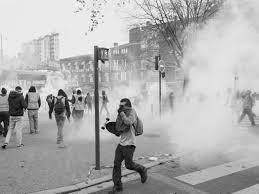"I Am The Regulator!": EU Commissioner Warns Social Media To Censor After French Riots

by Tyler Durden
And in a contemporary echo of that famous phrase, EU Internal Market Commissioner Thierry Breton repeatedly stressed on Monday that "I am the regulator" when lambasting social media networks for "not having done enough" during the recent French riots and threatening them with sanctions, including even banishment, if they should remain similarly inactive after August 25.
Well, namely censorship: suppression of content that the European Commission deems to have been in some way or another harmful in the circumstances. Hence, the importance of the August 25 date. For August 25 will mark exactly four months since the European Commission officially designated 17 "Very Large Online Platforms" and two "Very Large Online Search Engines," and from that date forward, per the below timeline, the designated entities will have to be in compliance with the EU's Digital Services Act (DSA), which is designed precisely to "regulate" online speech.
reton made his remarks in conversation with the French public broadcaster France Info, noting that in the future the social media companies will have to be proactive in deleting content or face sanctions.
“When there is hateful content,” he said, “content that calls, for example, for revolt, also that calls to kill – because we’ve seen that too, [from] individuals – …they will have the obligation to delete it instantly. If they don’t do it, they will be immediately sanctioned.”
Breton did not give any specific examples of content calling for violence, much less murder.
But, interestingly, when one of the interviewers repeatedly tried to point the finger at Twitter as one of the main offenders, Breton was quick to correct him: noting that the main offenders, per coverage in the French press, are rather TikTok and Snapchat.
Given the correspondence between the notably young demographics of the French rioters and the demographics of TikTok and Snapchat users, this is hardly surprising in fact. Moreover, the content that has been widely cited as circulating on TikTok and Snapchat – and sometimes indeed reproduced in the traditional French media itself (see here, for instance) – consists not so much of calls to violence, as video documentation of the violence that has occurred.
This proliferation of videos of the French violence on social media and via messaging apps appears to be the real target of Breton’s wrath.
Indeed, the Commissioner referred to it himself, even suggesting that platforms were using algorithms to make such material go viral – as if they would have to!
The indulgence shown by Breton towards Twitter is also unsurprising, since many observers (including the present author) noticed videos of the French violence posted on Twitter quickly disappearing. This suggests that Twitter was indeed acting proactively to suppress the material in question.
It can be wondered in passing what exactly is the justification for suppressing genuine documentation of the violence and destruction – this is, after all, a form of information, not “disinformation” – and whether its suppression will not in fact create a void that will be filled precisely by inauthentic “fake news.”



























